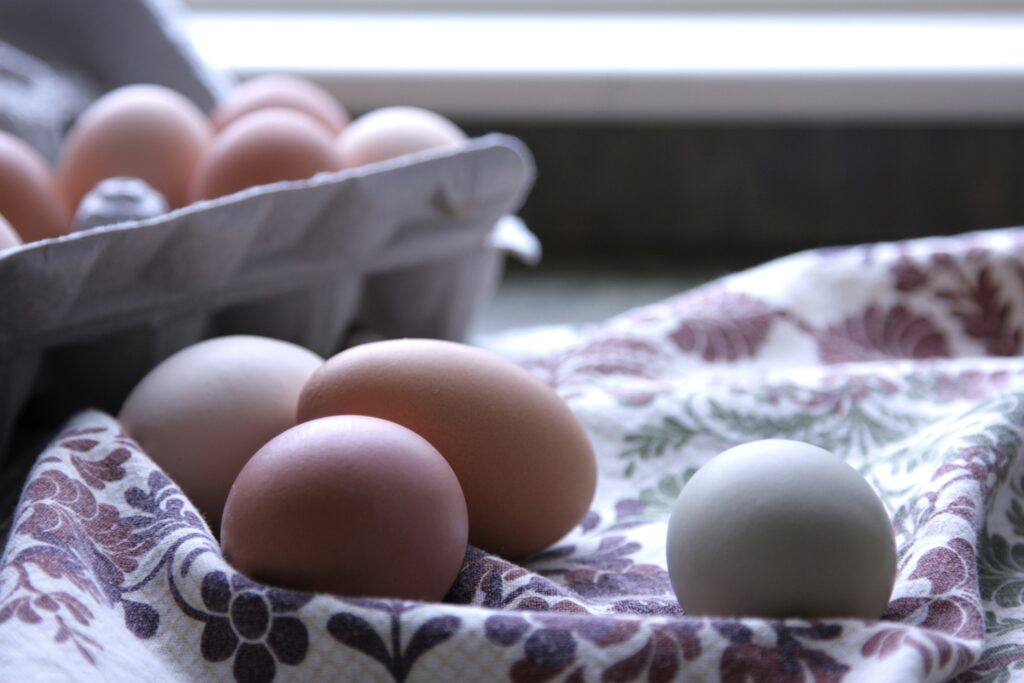Introduction: Why Egg Storage Matters
Eggs are nutrient-dense and protein-rich, making them a staple in households worldwide. But improper storage can turn this superfood into a food safety hazard. Whether you’re baking, frying, or boiling, understanding how to handle and store eggs properly is critical to avoid foodborne illnesses, especially salmonella.

Photo by Asim Z Kodappana on Unsplash
How Long Can Eggs Be Left Out at Room Temperature?
USDA Guidelines on Egg Storage
According to the United States Department of Agriculture (USDA), eggs should not be left out at room temperature for more than 2 hours. Once eggs reach temperatures above 40°F (4°C), bacteria such as Salmonella Enteritidis can multiply rapidly.
Quick Fact: After two hours at room temperature, the risk of bacterial contamination increases significantly.
Differences Between Washed vs. Unwashed Eggs
- Washed eggs (U.S.): Have their natural protective layer (bloom) removed, requiring refrigeration.
- Unwashed eggs (Europe/farm-fresh): Retain the bloom, making them safe for room-temperature storage (up to 2-3 weeks in cool environments).
Factors That Influence Egg Shelf Life
Temperature and Humidity
Eggs are sensitive to environmental conditions:
- High humidity promotes mold and bacterial growth.
- Room temperatures (above 70°F) accelerate spoilage.
Shell Integrity
Cracks allow bacteria to penetrate and spoil the egg quickly. Always discard cracked or damaged eggs.
What Happens When Eggs Are Left Out Too Long?
Bacterial Growth and Salmonella Risk
Leaving eggs out for extended periods gives pathogens like Salmonella the perfect conditions to multiply, leading to:
- Food poisoning
- Nausea, vomiting, and fever
- In severe cases, hospitalization
Nutritional Degradation
Proteins and vitamins start breaking down when exposed to fluctuating temperatures, especially vitamin A, D, and B-complex.

How to Tell If an Egg Has Gone Bad
The Float Test
Place the egg in a bowl of water:
- Sinks and lays flat: Fresh
- Sinks and stands upright: Still usable
- Floats: Spoiled – discard immediately
Smell and Visual Inspection
Crack the egg into a bowl:
- Fresh egg: No odor, clear whites, firm yolk
- Spoiled egg: Sulfur-like smell, runny or discolored whites/yolk
Can You Leave Farm-Fresh Eggs Out?
Country Variations: US vs. Europe
- U.S. regulations require washing eggs, thus refrigeration is mandatory.
- In Europe, eggs are often sold unwashed and kept at room temperature in supermarkets.
Rule of Thumb: If it’s refrigerated at the store, refrigerate it at home.
Best Practices for Storing Eggs Safely
Refrigeration Tips
- Store eggs at or below 40°F (4°C)
- Keep them in their original carton
- Avoid placing eggs on the fridge door (temperature fluctuations)
Storage Containers and Placement
- Use a designated egg tray with a lid
- Place eggs near the back of the fridge for consistent temperature
Tips for Handling Eggs to Reduce Contamination
- Wash hands before and after handling eggs
- Sanitize surfaces that come in contact with raw eggs
- Don’t reuse the same bowl for cracked eggs and final mixture
- Use eggs before their “Best By” date
Can Cooked Eggs Be Left Out?
Guidelines for Hard-Boiled Eggs
- Hard-boiled eggs should be refrigerated within 2 hours
- They last up to 1 week in the fridge
Safety Tips for Egg-Based Dishes
- Dishes like deviled eggs, egg salad, or casseroles should not sit out longer than 2 hours
- Use ice packs if serving outdoors or at events

Photo by Alex Ruggieri on Unsplash
Common Myths About Egg Storage
- “Room-temp eggs bake better”
Partially true, but don’t leave them out for more than 30 minutes. - “Washing eggs at home makes them cleaner”
False. This removes the protective bloom and increases spoilage risk. - “If it smells fine, it’s safe”
Not always. Some spoiled eggs don’t emit a strong odor immediately.
Frequently Asked Questions (FAQs)
1. Can I leave eggs out overnight?
No. Eggs should not be left out longer than 2 hours at room temperature. Overnight exposure significantly increases the risk of bacterial growth.
2. Do farm-fresh eggs need to be refrigerated?
If unwashed, they can be kept at room temperature for up to 2–3 weeks. Once washed, they must be refrigerated.
3. How long do eggs last in the fridge?
Typically, 3–5 weeks if stored properly in their original carton.
4. Can you freeze eggs?
Yes. Crack and beat them before freezing. Use within 1 year for best quality.
5. What happens if I eat a bad egg?
Symptoms may include nausea, diarrhea, stomach cramps, and fever—signs of foodborne illness.
6. How do I know if my fridge is cold enough for eggs?
Use a fridge thermometer to ensure it stays at or below 40°F (4°C).

Photo by Emiel Maters on Unsplash
Conclusion
Eggs are versatile and nutritious, but they demand proper storage and handling. To avoid waste and protect your health, always refrigerate washed eggs, especially in warm climates. Use the float test and smell check when in doubt. Whether farm-fresh or store-bought, understanding the risks and best practices around egg safety is a must for every kitchen.
